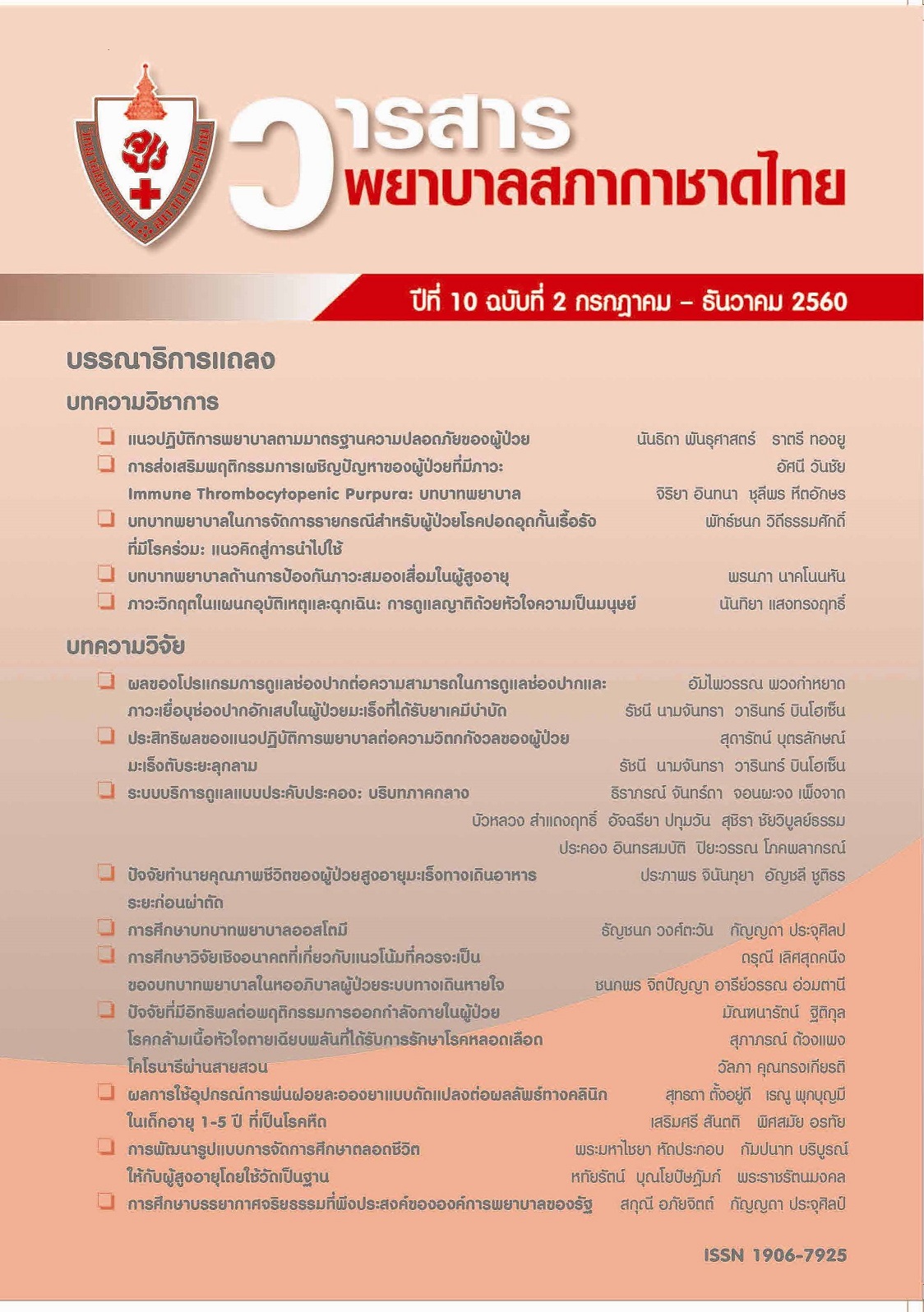Factors Influencing Exercise Behavior among Acute Myocardial Infarction Patients After Percutaneous Coronary Intervention
Keywords:
โรคกล้ามเนื้อหัวใจตายเฉียบพลัน, พฤติกรรมการออกกำลังกาย, acute myocardial infarction, exercise behaviorAbstract
การวิจัยเชิงทำนายนี้ มีวัตถุประสงค์เพื่อศึกษาพฤติกรรมการออกกำลังกายและปัจจัยที่มีอิทธิพลต่อพฤติกรรมการออกกำลังกายในผู้ป่วยโรคกล้ามเนื้อหัวใจตายเฉียบพลันที่ได้รับการขยายหลอดเลือดหัวใจ ได้แก่ การรับรู้สมรรถนะของตนเอง การสนับสนุนจากครอบครัว ภาวะซึมเศร้า ความรุนแรงของโรค การรับรู้ความเจ็บป่วยและระยะเวลาหลังการขยายหลอดเลือดหัวใจ กลุ่มตัวอย่างเป็นผู้ป่วยที่มาติดตามผลการรักษาในคลินิกโรคหัวใจ โรงพยาบาลมหาราช จังหวัดนครราชสีมา จำนวน 145 ราย โดยวิธีการสุ่มอย่างง่าย เครื่องมือที่ใช้ประกอบด้วย แบบสอบถามข้อมูลทั่วไป แบบสอบถามพฤติกรรมการออกกำลังกาย แบบสอบถามการรับรู้ความสามารถของตนเองในการออกกำลังกาย แบบสอบถามการรับรู้ความเจ็บป่วย แบบประเมินภาวะซึมเศร้าและแบบสอบถามการสนับสนุนจากครอบครัว วิเคราะห์ข้อมูลโดยใช้สถิติเชิงพรรณนาและวิเคราะห์สถิติถดถอยเชิงพหุแบบขั้นตอน
ผลการวิจัยพบว่ากลุ่มตัวอย่างมีพฤติกรรมออกกำลังกายโดยรวมอยู่ในระดับปานกลาง (M = 40.4, SD = 14.83) การสนับสนุนจากครอบครัวและการรับรู้สมรรถนะของตนเองร่วมกันทำนายพฤติกรรมการออกกำลังกายได้ร้อยละ34 อย่างมีนัยสำคัญทางสถิติที่ระดับ.001 ค่าสัมประสิทธิ์ในรูปคะแนนมาตรฐาน (Beta) ตัวแปรที่ทำนายได้มากที่สุด คือ การสนับสนุนจากครอบครัว (β = .400, p < .001) และรองลงมา คือ การรับรู้สมรรถนะของตนเอง (β = .312, p < .001)
Factors Influencing Exercise Behavior among Acute Myocardial Infarction Patients After Percutaneous Coronary Intervention
This predictive study aimed to describe exercise behavior and the factors influencing exercise behavior among patients with acute myocardial infarction after percutaneous coronary intervention factors that influence perceived self efficacy, family support, depression symptom, severity of disease, illness perception, and time of post percutaneous coronary intervention among acute myocardial infarction after percutaneous coronary intervention patients. The sample consisted of 145 patients with acute myocardial infarction patient at the heart clinic and medical outpatient department of Maharat Nakhonratchasima hospital, Nakhonratchasima. The instruments included the personal record form, exercise behavior questionnaires, perceived self efficacy questionnaires, illness perception questionnaires, test of depression ,family support questionnaires, severity of disease and time of post percutaneous coronary intervention. Data were analyzed using descriptive statistics and multiple regression analysis with stepwise method.
The results revealed that the participants had a mean score of exercise behavior at the medium level (M = 40.4, SD = 14.83). Family support and perceive self efficacy predicted 34% of exercise behavior among acute myocardial infarction after percutaneous coronary intervention patients, family support and perceived self efficacy was the strongest predictor of family support (β = .400, p < .001) ,self efficacy (β = .312, p < .001)
Downloads
Published
Issue
Section
License
เนื้อหาบทความหรือข้อคิดเห็นต่างๆ ในวารสารพยาบาลสภากาชาดไทยนี้ เป็นความคิดเห็นของผู้เขียนบทความ ไม่ใช่ความเห็นของกองบรรณาธิการ หรือสถาบันการพยาบาลศรีสวรินทิรา สภากาชาดไทย






